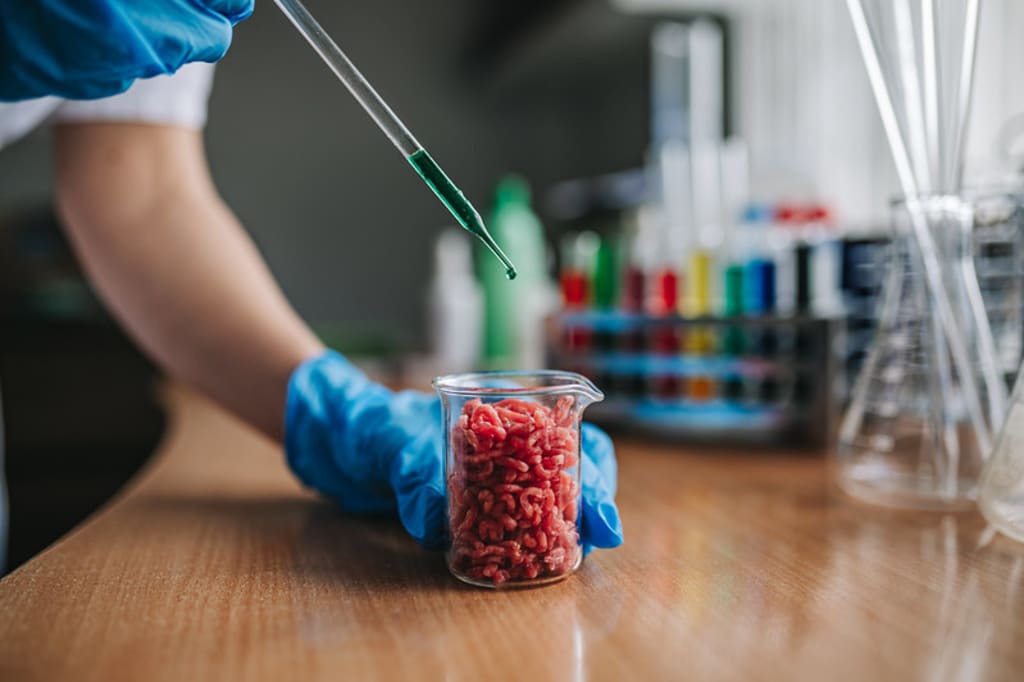Opinion: Not Investing in Lab-Grown Meat is a Massive Mistake
A Vegetarian’s Take on What The Future of Food Should Be

On May 1st, 2024, infamous Governor Ron DeSantis signed a contentious bill into law: the banning of lab-grown meat in Florida. Only six days later, Governor Kay Ivey signed Alabama’s version into law to follow Desantis’ lead. Claimed to be a protection of the beef industry in Florida and Alabama, the proponents of the law believe that the use of cultured meat is against nature and could result in harm to ranching as a livelihood. Notably, both states have also shared an undertone of anti-authoritarianism in their reasoning, stating concern over the federal government having jurisdiction over what is and isn’t allowed in stores. Though these states are the first to take action, there are several other measures across the United States close to passing similar bills, namely in Arizona and Tennessee.
I chose to stop eating meat about ten years ago as a protest against how my country treats animals in factory farms. Over the years, I learned to understand what a massive strain on our environment it was too which, despite missing meat, inspired me to continue a vegetarian/pescetarian lifestyle even when companies began to showcase when their animals were happily kept in open fields without mistreatment and hormonal injections. When I heard news of the lab-grown meat alternative I was, frankly put, hyped as hell. Honestly? Meat is really delicious — and this would offer an additional alternative that could satisfy the ethicality and environmental protection I’m searching for as a consumer. And then, like so many other topics in the U.S., it became politicized (surprise, surprise).
So, I dove into the world of lab-grown meat to investigate the truth of the matter before it becomes a collection of politician blurbs in the election cycle. My personal preferences aside, it is a measurable travesty to hold back on this innovation, preventing well-meaning scientific folks from developing a whole field of food science. If, instead of shying away from change and technological advancement, we adjust with this new scientific ability, the positive effects could be significant and broad, improving many facets of the global human experience (and the planet too!).
The Numerous Benefits of a Lab-Grown Meat Option
The meat consumption in the United States is nearly off-the-charts compared to the rest of the world — with the USDA reporting that the average folk in our country is consuming more than 40% more meat than they should be. In the past few decades, the demand has spiked upward at an alarming rate. With this increase, of course, there’s a higher demand for more ranches and more cows than ever. Ideally, we’d see a literal expansion of ranches, with more space dedicated when a rancher has more head to care for. Unfortunately, large companies have, instead, opted for decreasing the amount of space per head, resulting in cramped, unhealthy conditions for animals — resulting in the detestable factory farm conditions you may have seen in vegan documentaries or PETA posts.
The current conditions we subject animals to in the U.S. are, needless to say, reprehensible, especially considering how much we’ve learned about the incredible cognitive and emotional abilities of cows, pigs, chickens, and other farm animals raised for our consumption. Certainly, the culturing of non-sentient meat in labs is a moral improvement from vast animal suffering. But, animal welfare aside, these factory farms have also had a massive impact on the viability of small-scale family-run cow farms. According to the USDA’s Census of Agriculture, there are less than one-third as many family-scale dairy farms as there were at the turn of the century. With such strain on small farms, lab-grown meat facilities could serve as a means to aid those smaller farms. Some organizations, including Innovation for Agriculture, believe that this advancement in the field could aid small farmers, providing them additional revenue as these labs purchase samples of healthy, grass-fed livestock and could likely also raise the prices of their premium, non-lab-grown meat.
Lab-grown meat alternatives on the market aren’t only a benefit for animals and small farmers either. They have the potential to make a significant positive impact on public health, food security, and environmental protection too! Since lab-grown meat is generated without the need for intestinal tracts growing beside them, it’s less likely that there will be fecal contamination, which is one of the primary causes of meat spreading disease through consumption. In addition, as the meat alternative is already in a lab setting, scientists will be able to more easily screen the samples for diseases and bacteria. But, healthwise, the meat can also be more easily grown free of hormones and can be genetically modified to be healthier and more nutritious (similar to golden rice). Not only could this advancement provide better-quality low-priced meat, it could also potentially alleviate global food insecurity.
Environmentally, there is some potential that these facilities could produce less emissions than traditional meat farming, but the emission results are heavily dependent on the production pipeline, transportation, power used, and the food grade required by our government — all of which are still in development. For now, it is uncertain whether the addition of this tech will have a positive impact on climate change mitigation. The tech, however, does have great potential to decrease the total amount of land use, feed use, and water use — respectively resulting in less deforestation, a larger percentage of our crops usable for human consumption, and less stress on water availability.
Why are People Anti-Lab Meat Still?
Despite FDA approval in 2022 and USDA approval in 2023, there’s still a massive amount of concern and general skepticism around the idea of lab-grown meat being made available for consumption. And, as is the usual case for our dear country, this has been paired with a copious supply of exaggerations and misinformation being spread, muddying the waters of actual, valid concerns that need to be addressed.
For your reference:
- Lab-grown meat has not been sold in grocery stores (learn more).
- Human cells were not used in the development of lab meat (learn more).
- Aldi was, in fact, not selling lab-grown meat (learn more).
- When made available, the USDA will require that meat alternatives be labeled as cell-cultivated (learn more)
- Lab-grown meat is not made from cancer cells (learn more).
The aforementioned valid concerns, however, are numerous. Some critics worry that the new form of food may have unintended negative health side effects that have yet to be noticed in short-term use. Others have pointed out that the price of production is far too high to be considered a feasible cheap alternative to premium, real meat. Others still doubt the ability to replicate the taste and texture of real meat with this method, fearing it may be a less enjoyable solution. And, for some, the admittedly futuristic idea feels, simply, far too unnatural and sci-fi for their liking. If you resonate with any of these worries, they’re totally reasonable and absolutely should be addressed before lab-grown meat makes its way to the grocery aisles.
Thankfully, many of these issues are rather addressable. First, of course, we can advocate for the strengthening of regulations around lab meat so that companies will be required to be transparent with both their use of and research into it. Though government bodies have already required the disclosure of its use, providing additional information could make a huge impact on how comfortable we all are around actually purchasing and eating the stuff. The more safety protocols around the new industry, the better it is for us all.
We can also advocate for government support around the issue, encouraging the funding of and incentivizing research and development so that we can learn more about the alternative. The more we know, the more we’ll become assured that it is indeed safe, and further research has the potential to improve the product and drive down costs.
And, as always, we can educate those around us about the potential benefits of lab-grown meat, and how this new, incredible technology can be used as a force for good. The more we all collectively understand, the better we will be able to choose how we should move forward with lab meat.
--
Ultimately, the future success of lab meat depends on us, the consumers, and by what standards we choose to accept it. Though I surmise that some will be unwilling to move past the initial “yuck” response that comes with the innovation, I’m optimistic that the availability of new cell-cultured products will positively affect the U.S. as a whole and, less importantly, offer the veggie-eaters like me an ethical alternative that will allow us to enjoy barbeque ribs, spicy wings, and juicy steaks. As we excitedly (or anxiously) await the addition of lab meats into our diets, I encourage you to learn more about the incredible innovation on our doorstep.
The more we know, the higher standards we can hold companies to.
--
Cross-posted from Medium. Follow my account for new science articles twice a month! :)
About the Creator
Olivia L. Dobbs
Science Enthusiast, Naturalist, Dreamer, Nerd.
I crosspost my Medium articles here :)
You can find my main account on Medium: https://medium.com/@oliviadobbs13
Check out my science! -> bit.ly/DobbsEtAl
Enjoyed the story? Support the Creator.
Subscribe for free to receive all their stories in your feed. You could also pledge your support or give them a one-off tip, letting them know you appreciate their work.






Comments (1)
Loved reading this! thank you :)